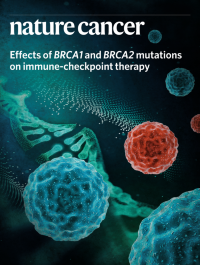Volume 1
-
No. 12 December 2020
Distinct effects of BRCA1 and BRCA2 mutations on immune-checkpoint therapyMutations in BRCA1 and BRCA2 result in distinct mutational genomic landscapes, which leads to differential effects on the tumor immune microenvironment and responses to immune-checkpoint therapy.
See Samstein, Krishna, Ma et al.
-
No. 11 November 2020
Bispecific nanobodies stabilize iNKT cell interactions for immunotherapyVHH1D12 bispecific single-chain nanobodies stabilize interactions between invariant natural killer T cell receptors and MHC I–like CD1d molecules, which leads to enhanced anti-tumor immunity.
See Lameris et al. and the accompanying News & Views by Exley and Blumberg
-
No. 10 October 2020
Aging-induced metabolic rewiring accelerates tumor growthAge-associated loss of mitochondrial complex I and IV in human colonic crypts induces metabolic remodelling, including upregulation of PHGDH, resulting in favorable metabolic conditions for tumor growth.
See Smith et al. and the accompanying News & Views by Prag and Murphy
-
No. 9 September 2020
Oncolytic nanoparticle immunotherapeuticsSelf-replicating lipid nanoparticles encoding IL-12 RNA induce priming of CD8+ T cells and immunogenic cell death in established tumors.
See Li et al. and the News & Views article by Kepp and Kroemer.
-
No. 8 August 2020
Pan-cancer digital pathology predicts genetic alterations and prognosisAlgorithm-generated mosaic of histology images illustrating how computer vision learns genomic traits from digital pathology slides for cancer classification and prognostication.
See Fu et al. and also the related Kather et al. and the News & Views article by Coudray and Tsirigos.
-
No. 7 July 2020
Stromal heterogeneity unraveledUnravelling the dynamic changes in cancer-associated fibroblast subpopulations during breast cancer progression.
See Friedman et al..
-
No. 6 June 2020
Linking EMT and the microbiome to colorectal cancer developmentEpithelial–mesenchymal transition synergizes with the intestinal microbiome to boost the development of colorectal cancer.
See Slowicka et al.
-
No. 5 22 May 2020
Tracing the effects of tumor mutations on T cell differentiationCharacterizing the effects of tumor mutational burden on CD4+ and CD8+ T cell differentiation in non–small-cell lung cancer through the use of multi-omics.
See Ghorani et al.
-
No. 4 April 2020
Pan-cancer genomic landscapes of advanced tumors after therapyPleasance et al. report that the mutation spectrum in advanced and treated cancers varies substantially across tumor types and is shaped by external mutagens such as cancer therapies.
Each ellipse system represents the mutation spectrum of an individual patient in the POG570 cohort, with the opacity of each system representing the duration since the diagnosis of advanced disease. Each ellipse within a system depicts a specific base change, scaled by the number of mutations that exhibit that change and angled by the proportion of mutations in that sample that contribute to that change.
See Pleasance et al. and the News & Views article by Rheinbay
-
No. 3 March 2020
Spotlight on Cancer GenomicsIn this issue, we are launching a Series on Clinical Cancer Genomics, comprising commissioned articles that explore the role of genomics in cancer research and oncology and a selection of primary research articles published in Nature Cancer.
See our March Editorial, the Review article by Cescon et al. and the Cancer in Translation article by Kreisberg et al.
-
No. 2 February 2020
Defining the phenogenomic landscape of breast cancerBodenmiller and colleagues pair imaging mass cytometry with multiplatform genomics to define single-cell phenotypic and genomic features of breast cancer with spatial context, finding associations with breast cancer subtypes and prognosis.
See Ali et al. and Angelo
-
No. 1 January 2020
Understanding the complexities of cancerOur inaugural issue highlights the complexities of cancer, featuring articles on cancer evolution, heterogeneity and population-specific disparities, identifying cancer drivers and the origins of metastasis-initiating cells. Highlighting diverse aspects of immunotherapy are studies on sensitizing tumors to immune-checkpoint blockade, improving predictors of response and devising therapeutic trispecific antibodies.
See Editorial












